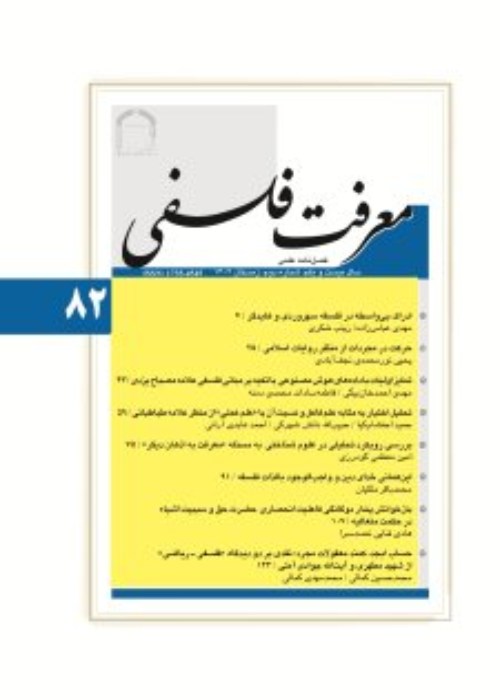Human Existential Role in Knowledge: a Comparative Study on Mullā Ṣadrā and Heidegger
Author(s):
Abstract:
There are two major interpretations of the role of human existential role in knowledge: 1) a passive role (as a blank tablet): the pictures of things are projected onto him or to a special level of his existence, called mind; 2) an active role (proposed for the first time by Kant). In both theories, human existence is considered as an obstacle to the manifestation of things as they are, and therefore, the possibility of gaining access to the things as they are becomes problematic. Even Kant concluded that it is impossible to know reality as it is.The author in this article argues that Mullā Ṣadrā and Heidegger opened a new way in this regard. They share the idea that the role of human being in the act of understanding is merely providing a ground for manifestation, so that things manifest themselves as they are. Human being does not impose anything onto the things he understands, instead, because of his unique existential structure, he allows things to show themselves as they are.
Language:
Persian
Published:
Marifat-i Falsafi, Volume:7 Issue: 2, 2010
Page:
13
magiran.com/p730044
دانلود و مطالعه متن این مقاله با یکی از روشهای زیر امکان پذیر است:
اشتراک شخصی
با عضویت و پرداخت آنلاین حق اشتراک یکساله به مبلغ 1,390,000ريال میتوانید 70 عنوان مطلب دانلود کنید!
اشتراک سازمانی
به کتابخانه دانشگاه یا محل کار خود پیشنهاد کنید تا اشتراک سازمانی این پایگاه را برای دسترسی نامحدود همه کاربران به متن مطالب تهیه نمایند!
توجه!
- حق عضویت دریافتی صرف حمایت از نشریات عضو و نگهداری، تکمیل و توسعه مگیران میشود.
- پرداخت حق اشتراک و دانلود مقالات اجازه بازنشر آن در سایر رسانههای چاپی و دیجیتال را به کاربر نمیدهد.
In order to view content subscription is required
Personal subscription
Subscribe magiran.com for 70 € euros via PayPal and download 70 articles during a year.
Organization subscription
Please contact us to subscribe your university or library for unlimited access!


